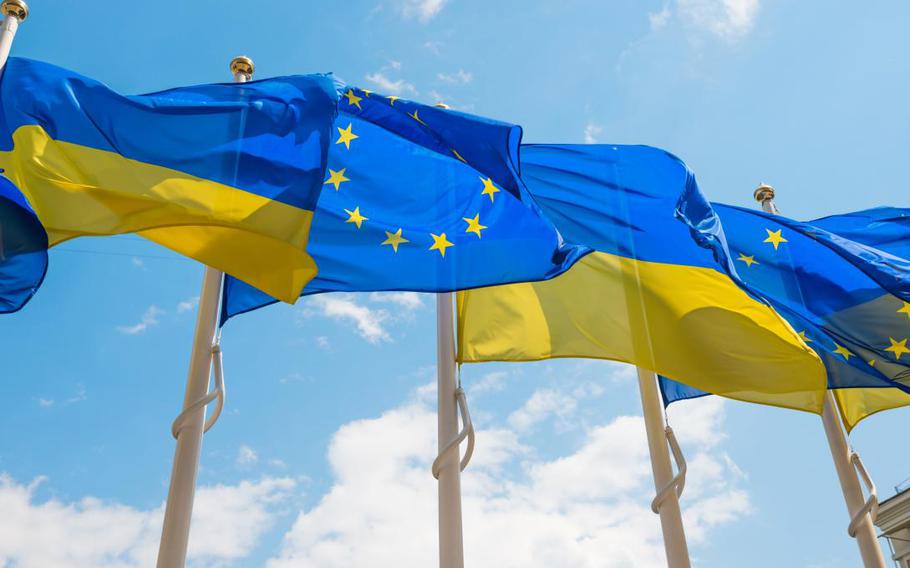
The European Union and Ukrainian flags side by side. The E.U.’s sanctions on Russian assets helps fund aid packages for Ukraine. (E.U. Delegation to the U.S.)
European Union member states reviewed three proposals to tweak the bloc’s sanction regime in order to assuage American concerns and unlock a plan to deliver $50 billion in aid to Ukraine backed by the profits of frozen Russian central bank assets.
The E.U. sanctions that keep the Russian assets immobilized need to be renewed by unanimous vote every six months. The U.S. has sought assurances that the assets will remain frozen since their profits will be used to repay the aid package.
One of the options proposed by the European Commission, the bloc’s executive arm, on Friday was to extend the renewal period for the asset freeze to 36 months, according to people familiar with the talks.
Another proposal would prolong the renewal period for five years, said the people, who spoke on the condition of anonymity. The final offer would extend both sectoral sanctions and the central-bank asset freeze for 36 months.
The E.U., the U.S. and other Group of Seven allies have been working to provide Ukraine the loans by the end of the year. The package is instrumental for Kyiv to continue receiving aid from the International Monetary Fund’s $15.6 billion assistance program for the war-battered country.
Ukraine on Tuesday passed an IMF staff review to unlock $1.1 billion in aid. It happened after the Fund had received assurances from the U.S. and E.U. that the frozen-asset funds will be forthcoming, according to officials familiar with the talks.
A majority of the E.U. ambassadors during the meeting were open to the options proposed by the commission, with extending the renewal period for the sanctions covering the assets to 36 months seen as the most feasible, said the people.
Hungary, which has delayed the sanction renewal process in the past and is seen as the most Russia-friendly of the E.U. countries, didn’t take a stance, since it holds the bloc’s rotating presidency, according to the people.
The commission may offer more details on how to change the sanction regime as soon as Monday, as member states want to see more information.
E.U. leaders tried to reassured U.S. officials in a joint statement after their June summit, saying that “Russia’s assets should remain immobilized until Russia ceases its war of aggression against Ukraine and compensates it for the damage caused by this war.” European officials have also pointed to the fact that sanctions against Russia have been in place since 2014.
The agreement reached at the G-7 summit would see the E.U. and the U.S. providing loans of around $20 billion each, according to officials familiar with the deal. The U.K., Canada and Japan would contribute smaller loans.
The primary goal for the E.U. is to have the U.S. participate in the aid package, but some E.U. officials are considering the idea to move forward without the Americans.
With assistance from Alberto Nardelli.
More stories like this are available on bloomberg.com.
©2024 Bloomberg L.P.